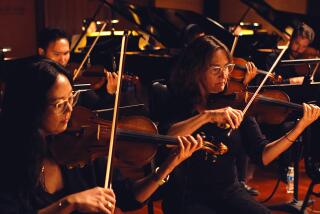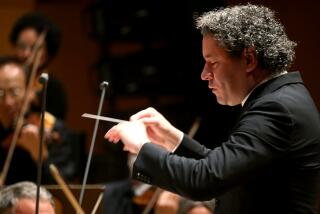Better B Sharp
- Share via
Those of you who have a firm grasp on microtonal music, skip the next few paragraphs. The rest of you: Read closely. Very closely.
A B flat is not an A sharp. And there are not necessarily 12 notes in an octave.
That’s right, says Pierce College music professor John Schneider. Forget what you learned in piano lessons.
Microtones are the sounds you don’t often hear in music--the ones at frequencies between the notes in the 12-tone scale. You hear them, for instance, when a blues guitarist bends a note. “But they’re in motion,” Schneider says. “Here, we’ve captured them in one spot.”
Music composed and played using these in-between tones is the focus of “MicroFest,” a concert Saturday night at Pierce College that features specially tuned guitar, harp, vibraphone and chimes.
John Schneider has been teaching music at Pierce College for 15 years. Two years ago, he was invited to play in a microtonal festival in Denver and another such festival has been ongoing in New York for more than 10 years. Schneider decided L.A. should have its own “MicroFest.”
“Because it’s time,” says Schneider with the conviction reserved for the converted. And he thinks there will be plenty of interest. “There are a lot of sophisticated musicians in Los Angeles.”
As it turns out, the scale that we’re all so used to hearing is not that old. Simply speaking, back when everyone had their own lute, they could tune it however they pleased. But when the musicians started to play more complicated music in the 18th century, they settled on what is now called equal tempered tuning.
A pitch is determined by the frequency of sound waves it produces. But for a piano to be able to play every pitch perfectly in tune in all 12 major and minor keys, it would have to have 53 keys per octave. Obviously, compromises had to be made.
They settled on 12 notes, equally spaced. While highly functional, this system is theoretically imperfect. An E flat is not an acoustically perfect E flat, nor a perfect D sharp. It’s a compromise.
So some of the music at “MicroFest” will be played in “just intonation,” where the intervals between pitches are tonally perfect. Others will be in “divisional intonation,” where the scale is divided into more than 12 parts--for example 19, or 34.
Guitarist Neil Haverstick, for example, plays blues, reggae, country and avant-garde music on his 19- and 34-tone guitars. “Dude, I’m a freelancer here in Denver,” he said during a phone interview. “I play everything.” Whether the difference is noticeable to those of us without perfect pitch depends on the composition. Haverstick has jammed 19-tone blues in bars, he said, “and people get up and dance and they don’t even know.”
Haverstick got into microtonal music about seven years ago. “To me the 12-tone Western system is a little stale,” he says. There are fantastic musicals playing jazz, rock and classical music today--but it’s all the same old scale. “I think a lot of people are getting bored and I think they might be open for new sounds.”
Interest in microtones has gotten a boost from computer-generated music. Computers can create these special tones without the hassle of building a new instrument. Microtonal pitches are standard on almost all synthesizers now. “So all these garage bands have this instrument at their fingertips,” says Schneider. “They just don’t know what to do with it.”
Listeners aren’t always sure what to do with it either. Schneider and Haverstick both have been told that their music sounds Middle Eastern, because that is most American’s only reference for music that isn’t in a 12-note scale. But Haverstick’s music is decidedly American, he says.
It’s the possibilities for new reactions to music that excites Haverstick. Minor chords are considered sad, Haverstick says, but what if your minor note is different?
“That’s what music is about--feelings,” he says. “I can hit a note that may make you feel something you’ve never felt before. And then you have to deal with it.”
BE THERE
“MicroFest,” 8 p.m. Sat. at Pierce College, 6201 Winnetka Ave., Woodland Hills. $10; $5, students and seniors. (818) 719-6476.
More to Read
The biggest entertainment stories
Get our big stories about Hollywood, film, television, music, arts, culture and more right in your inbox as soon as they publish.
You may occasionally receive promotional content from the Los Angeles Times.









